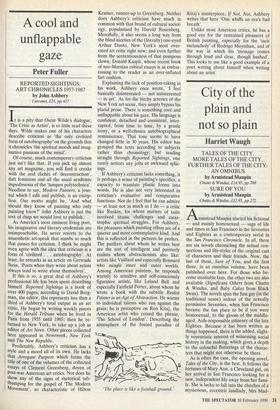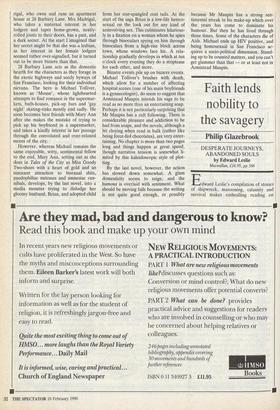City of the plain and not so plain
Harriet Waugh
TALES OF THE CITY, MORE TALES OF THE CITY, FURTHER TALES OF THE CITY: AN OMNIBUS by Armistead Maupin Chatto & Windus, f14.95, pp.768 SURE OF YOU by Armistead Maupin Chatto & Windus, f12.95, pp.272 Armistead Maupin started his fictional — and mainly homosexual — saga of life and times in San Francisco in the Seventies and Eighties as a contemporary serial in the San Francisco Chronicle. In all, there are six novels chronicling the sexual con- nections and life-styles of the original cast of characters and their friends. Now, the last of these, Sure of You, and the first three, in an omnibus volume, have been published over here. For those who be- come insatiable fans, the other two are also available (Significant Others from Chatto & Windus, and Baby Cakes from Black Swan). The novels span the first gay (in the traditional sense) ardour of the sexually permissive Seventies, when San Francisco became the fun place to be if you were homosexual, to the gloom of the middle- aged, Aids-responsible citizenry of the late Eighties. Because it has been written as things happened, there is the added, slight- ly voyeuristic interest of witnessing social history in the making, which gives a depth to the colourful flutterings of the charac- ters that might not otherwise be there.
As is often the case, the opening novel, Tales of the City, is the best. It follows the fortunes of Mary Ann, a Cleveland girl, on her arrival in San Francisco looking for a new, independent life away from her fami- ly. She is lucky to fall into the clutches of a mysterious, eccentric landlady, Mrs Mad- rigal, who owns and runs an apartment house at 28 Barbary Lane. Mrs Madrigal, who takes a maternal interest in her lodgers and tapes home-grown, neatly- rolled joints to their doors, has a past, and a dark secret. At the start I imagined that her secret might be that she was a lesbian, as her interest in her female lodgers seemed rather over-signalled, but it turned out to be more bizarre than that.
28 Barbary Lane acts as the domestic hearth for the characters as they forage in the exotic highways and seedy byways of San Francisco, looking for their individual nirvana. The hero is Michael Tolliver, known as 'Mouse', whose lighthearted attempts to find romance in the supermar- kets, bath-houses, pick-up bars and 'gay night' skating-rinks mostly end sadly. He soon becomes best friends with Mary Ann after she makes the mistake of trying to pick up his boyfriend in a supermarket, and takes a kindly interest in her passage through the convoluted and over-relaxed mores of the city.
However, whereas Michael remains the same enjoyable, witty, sentimental fellow to the end, Mary Ann, setting out as she does in Tales of the City as Miss Goody Two-shoes with a heart of gold and an innocent attraction to bisexual shits, paedophiliac nutcases and amnesiac can- nibals, develops, by the last novel, into a media monster trying to dislodge her gloomy husband, Brian, and adopted child
from her star-spangled coat tails. At the start of the saga Brian is a low-life hetero- sexual on the look out for any kind of uninvolving sex. This culminates hilarious- ly in a fixation on a woman whom he spies through binoculars spying on him through binoculars from a high-rise block across town, whose windows face his. A rela- tionship gradually develops in which at ten o'clock every evening they do a striptease for each other, and more.
Bizarre events pile up on bizarre events. Michael Tolliver's brushes with death, which allow for a number of affecting hospital scenes (one of his main boyfriends is a gynaecologist), do seem to suggest that Armistead Maupin intends his saga to be read as no more than an entertaining soap. Perhaps it is not particularly surprising that Mr Maupin has a cult following. There is considerable pleasure and addiction to be had from soaps, and the novels, although a bit cloying when read in bulk (rather like being force-fed chocolates), are very enter- taining. No chapter is more than two pages long and things happen at great speed, though narrative tension is somewhat li- mited by this kaleidoscopic style of plot- ting.
By the last novel, however, the action has slowed down somewhat. A glum domesticity seems to reign, and the humour is overlaid with sentiment. What should be moving fails because the writing is not quite good enough, or possibly because Mr Maupin has a strong sen- timental streak in his make-up which over the years has come to dominate his humour. But then he has lived through these times. Some of the characters die of Aids. Michael ends up HIV positive, and being homosexual in San Francisco ac- quires a socio-political dimension. Stand- ing up to be counted matters, and you can't get glummer than that — or at least not in Armistead Maupin.



















































 Previous page
Previous page